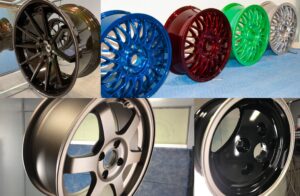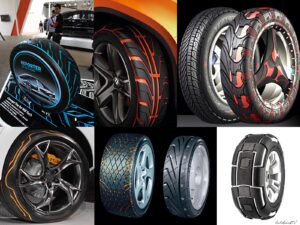
Custom Tire Rims
Custom tire rims, also known as aftermarket or custom wheels, are specialized rims that can be installed on a vehicle to enhance its aesthetics and performance. These rims are different from the original equipment manufacturer (OEM) rims that come with the vehicle and offer a unique and personalized look.
Custom tire rims come in a variety of styles, sizes, finishes, and materials. They can be made of various materials such as aluminum alloy, steel, or even carbon fiber. Some popular styles include classic spoke designs, modern split-spoke designs, mesh patterns, and more. The finish options range from polished or chrome-plated to painted or powder-coated in various colors.
Benefits of custom tire rims include:
1. Aesthetic Appeal: Custom rims allow you to personalize the look of your vehicle and make it stand out from others on the road. They can complement the vehicle’s overall design, reflect your style preferences, and add a touch of uniqueness.
2. Wheel Fitment: Custom rims offer flexibility in terms of size and offset, allowing you to select rims that are optimized for your specific vehicle. You can choose rims with a different diameter, width, and offset, which can enhance the vehicle’s stance, performance, and handling characteristics.
3. Performance Enhancement: Upgrading to custom rims can offer performance benefits. For example, lightweight rims can reduce unsprung weight, leading to improved acceleration, braking, and handling. Additionally, wider rims can accommodate wider tires, which can enhance traction and cornering capabilities.
4. Brake Clearance: Some custom rims are designed with larger diameters or spoke designs that provide better clearance for performance braking systems. This can be advantageous if you plan to upgrade your vehicle’s brakes.
When considering custom tire rims, it’s important to keep the following factors in mind:
– Proper Fitment: Ensure that the custom rims you choose are compatible with your vehicle’s specifications, including bolt pattern, center bore, and offset. Consult with a reputable wheel specialist or refer to manufacturer guidelines for proper fitment.
– Quality and Safety: Opt for rims from reputable manufacturers to ensure their quality, durability, and safety standards. Look for certifications such as JWL or TUV to ensure compliance with industry standards.
– Tire Compatibility: Consider the compatibility of custom rims with tires. Ensure that the rim size and width are suitable for the tires you plan to install.
– Maintenance: Custom rims may require specific care and maintenance to keep them in good condition. Follow the manufacturer’s guidelines for cleaning, maintenance, and recommended cleaning agents to protect the rims’ finish.
Custom tire rims offer an opportunity to customize your vehicle’s appearance and performance according to your preferences. However, it’s essential to select high-quality rims that are properly fitted and maintained to ensure both safety and longevity.
Size:
The size of your rims should match the size of your tires. You can find this information on the sidewall of your tires.
Material:
Rims can be made from various materials, including aluminum, steel, and alloy. Each material has its pros and cons, so it’s important to consider your budget, driving habits, and desired look.

Tire size:
The size of your tires should match the size recommended by the vehicle manufacturer. You can find this information on the sidewall of your tires or in your vehicle owner’s manual.
Season:
If you live in an area with changing weather conditions, you may want to consider getting seasonal tires. Winter tires are designed to provide better traction in cold and snowy conditions, while summer tires are designed to provide better performance in warm and dry conditions.
Tread pattern:
The tread pattern can affect the tire’s performance in wet, dry, or snowy conditions. Look for tires with a tread pattern that matches the weather conditions you typically drive in.
Tire type:
Tires can be categorized as all-season, performance, touring, or off-road. The type of tire you choose can depend on your driving style and the conditions you typically drive in.
Brand and quality:
Look for reputable tire brands and choose high-quality tires to ensure optimal performance and safety on the road.
Price:
Tires can range in price, so consider your budget when selecting tires. Keep in mind that investing in high-quality tires can provide better performance, longer lifespan, and potentially save you money on repairs in the long run.
It’s always a good idea to consult with a professional at a tire shop to help you choose the best tires for your car. They can help you understand your options and make the best decision based on your individual needs and preferences.
Style:
Rims come in a variety of styles, including spoke, mesh, and multi-piece. Choose a style that complements your vehicle’s design and matches your personal taste.
Performance:
Some rims are designed for better performance, such as reducing weight to improve handling or adding ventilation to reduce brake heat. If you prioritize performance, consider rims with these features.
Ultimately, the best rims for your tires will depend on your individual needs and preferences. Consider consulting with a professional at a tire or automotive shop to help you make the best decision for your vehicle.